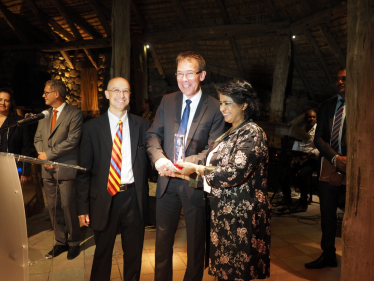Julian Allendorf (IfM) Receives GSSI Best Doctoral Student Paper Award

For his paper on “Direct Selling Distributors – Why Do They Stay or Leave!”, Julian Allendorf has been awarded with the GSSI 2017 Best Doctoral Student Paper Award. The prize-winning paper is based on joint work with professors Anne T. Coughlan, PhD (Northwestern University, USA) and Dr. Manfred Krafft (Muenster). The award was handed over to Manfred Krafft by the President of Mauritius, Ameenah Firdaus Gurib-Fakim (see photo) during a conference reception on June 8.
In their joint research, Anne Coughlan, Manfred Krafft and Julian Allendorf investigate direct selling, a major form of distribution that is highly reliant on independent distributor salespeople. Little is known in the academic literature about direct selling in general, or about individual distributors’ motives to stay or leave, despite the importance of distributor satisfaction and retention to direct selling companies. In their research, the authors highlight similarities and differences between traditional sales and direct selling, and build on Agency Theory to develop predictions about the ways in which individuals stay in the direct selling distributorship, and what explains their intention to leave. The authors analyze a unique dataset of over 13,000 individual direct-selling distributors from 68 firms, and model as well explain the differences between distributors with, versus without, an intention to leave, as a function of reasons to join and stay, firm/mentor factors, and performance success factors. Anne Coughlan, Manfred Krafft and Julian Allendorf show that distributors are both “born” and “made”: both individual characteristics, and the ongoing environment in which the distributor experience unfolds, influence the reasons to stay or leave. The results are consistent with the authors’ modified Agency Theory model and suggest academic, managerial and policy implications regarding direct selling investments and assessments.

